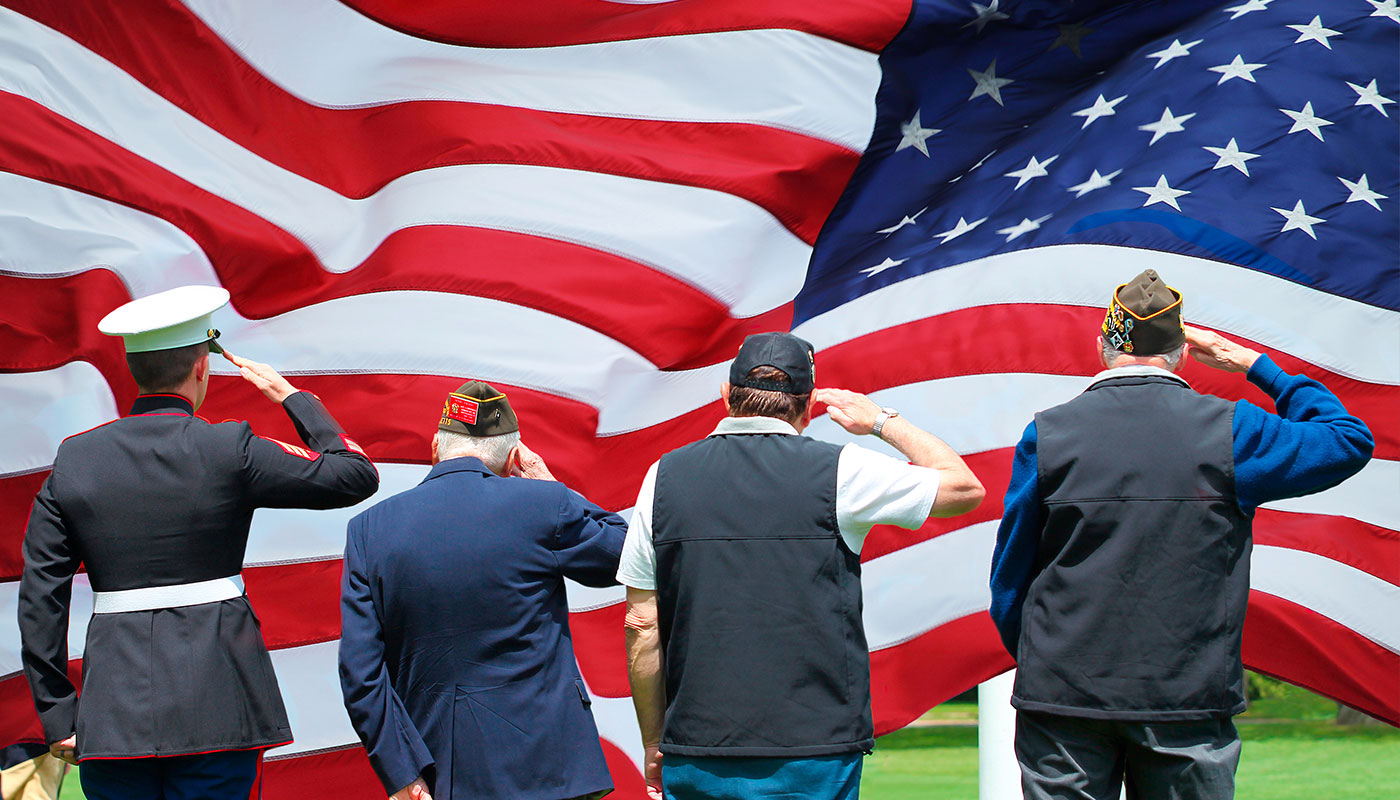Understanding Your Veteran Affairs Benefits
At Living Care Lifestyles, we honor our military veterans. We thank them for their service, and we want to make sure Veterans understand the benefits afforded to them. Below, we’ve provided a summary of those benefits, and we encourage you to check with the Veterans Benefits Administration to fully understand the types of benefits they provide.
Veterans are those military personnel who served in the active military, navy, or air service and who were discharged or released under conditions other than dishonorable.

Applying for
VA Benefits
You should contact an accredited Veteran Service Organization to assist you in applying for your benefits.
You may also qualify for Service-Connected (S/C) Compensation, which means you could receive compensation for a disability relating to an injury or illness you or your loved one incurred during military service. Additionally, you or your loved one may have a claim of survivor and due benefits. Other benefits may be due to required and regular medical need for assistance and supervision due to a disability.
Tools &
Resources
We want to make sure you have the tools and resources necessary to get your questions answered about your Veteran’s Affairs benefits.
Additional Military Veteran Resources
Living Care Lifestyles provides additional information for our military veterans.
Title 38 of the Code of Federal Regulations defines a veteran as “a person who served in the active military, navy, or air service and who was discharged or released under conditions other than dishonorable.”
In general, active service means full-time service, other than active duty for training, as a member of the Army, Navy, Air Force, Marine Corps, and Coast Guard; as a commissioned officer of the Public Health Service; or as a commissioned officer of the National Oceanic and Atmospheric Administration or its predecessors.
- Honorable Discharge (HD)
- Under Honorable Conditions (UHC) or General Discharge (GD)
- Other Than Honorable Conditions (OTH) or Undesirable Discharge
- Bad Conduct Discharge (BCD)
- Dishonorable Discharge (DD)
Veterans Benefits Administration
- Service-connected compensation and non-service connected pension
- Survivor’s Benefits (Dependency and Indemnity Compensation, and Death Pension)
- Education Benefits
- Vocational Rehabilitation
- Home Loans
- Life Insurance
- Burial Benefits
- Healthcare
- Preference in federal hiring
- Social Security Administration (SSA)
- Unemployment Insurance (if actively seeking work)
- Military retirement, medical severance and separation pay
- State programs including tuition assistance, emergency funds, PTSD and grief counseling, soldiers’ homes and elder care, fiduciary and guardianship, license plates, hunting and fishing licenses, park passes, burial plots, claim assistance, access to discharge papers and other Veteran records
- Apply Online (Recommended)
- Contact an accredited Veteran Service Organization (VSO)
- Download and mail a Standard Form
- Speak with us in person – Find Your Local Regional Benefit Office
- Applicants must now use Standard Forms:
- VA Form 21-526EZ for original or reopen compensation claims
- VA Form 21-527EZ for original or reopen pension claims
- VA Form 21-534EZ for Survivor benefit claims
- VA Form 21-0966 if you Intend to File a claim
- VA Form 21-0958 to file a Notice of Disagreement with a decision
- Disability compensation paid to veteran who is disabled by an injury/illness incurred or aggravated during military service
- Injury or illness does NOT have to be combat related or have been incurred during a period of war
- If granted, veteran assigned a percentage (0%, 10%, 20%…) which corresponds to a dollar value
- 10%=$136.24
- 50%=$855.41 (single vet with no dependents)
- 100%=$2973.86 (single vet with no dependents)
- Vets rated at or above 30% are entitled to add dependents to their award (VA Form 21-686c) which increases payment.
- For example, add spouse =$48.00 to $163.00 increase
- This benefit is NOT affected by other sources of income except when receiving Individual Unemployability.
Important: The date VBA receives a claim is generally the date of entitlement for benefits. For this reason, use VA form 21-0966 if you Intend to File a claim but don’t have everything assembled.
Any veteran is eligible for S/C compensation if they meet the criteria:
- Have service-related disability
- Have discharge that is other than Dishonorable
- Served on active duty
- Guard and Reserve Members generally need to have been called on to active duty under Title 10 or USC 32 (DD214 usually notates this)
Claims for PTSD
- Current diagnosis + in-service stressor + symptoms/condition medically related to in-service stressor (nexus)=likely grant of service connection for PTSD
- Vet needs to provide stressor statement demonstrating an in-service stressor caused him/her to fear of hostile military of terrorist activity (statement can be replaced by evidence of certain medals / ribbons on DD 214)
- Non-combat veterans: Need to provide stressor statement including who/what/where/when (2 month date range and year) / how of the traumatic event they experienced
- Respiratory cancers, such as cancers of the:
- lung
- bronchus
- larynx
- trachea
- Soft-tissue sarcoma
- Chloracne or other acneiform disease consistent with chloracne
- Type 2 diabetes mellitus
- Chronic lymphocytic leukemia
- AL amyloidosis
- Parkinson’s Disease
- Amyotrophic Lateral Sclerosis (ALS)
Income based benefit for veterans who are permanently and totally disabled and unable to work due to non-military-related conditions
- Purpose to bring the veteran’s total monthly income to a level set by congress (currently $1,097.17)
What does Permanent and Total mean?
- Age 65 or older
- Under age 65 but deemed unable to work based on medical evidence, or
- Residing in a Medicaid-approved nursing home.
- Have received other than dishonorable discharge
- Meet length-of-service criteria
- Service prior to 9-7-1980: served 90 days
- Service after 9-7-1980: served 24 consecutive months
- At least one day of service must be during period of war (did not have to be in combat)
- Permanently and Totally disabled – or 65+ years of age
- Countable income less than $12,868 yearly ($1,072.33 monthly) for a single veteran with no dependents
War Time Service Periods
- WWI: April 6, 1917 to November 11, 1918
- WWII: December 7, 1941 to December 31, 1946
- Korean War: June 27, 1950 to January 31, 1955
- Vietnam War: August 5, 1964* to May 7, 1975 (*In country from February 28, 1961)
- Gulf War: August 2, 1990 to present
Veteran needs to complete VA Form 21-526 or 21-527
- IF using 21-526, do not fill out compensation section unless vet attending to apply for this
- In income section, fill out EVERY line (if the question doesn’t apply or answer is “0”, write “0”)
- If form is not complete, we will need to do development, causing delays
What is Dependency and Indemnity Compensation?
Dependency and Indemnity Compensation (DIC) is a monthly benefit paid to eligible survivors of:
- Servicemembers who died while on active duty, active duty for training, or inactive duty training, or:
- Veterans whose death resulted from a service-connected injury or disease, or:
- Veterans whose death resulted from a non-service-connected injury or disease, and who were totally disabled from their service-connected disabilities for at least 10 years immediately preceding their death, or since the Veteran’s release from active duty and for at least five years immediately preceding death, or at least one year immediately preceding death if the Veteran was a Former Prisoner of War (FPOW) who died after September 30, 1999.
Accrued benefits are benefits that are due to the beneficiary based on an existing decision on a claim for benefits or evidence in the Veteran’s claim file at the date of death, but not paid prior to death.
Example: A claim for a recurring benefit had not been allowed, but the beneficiary died before award action could be taken, OR one or more benefit checks had not ben deposited or negotiated.
VA burial allowances are flat-rate monetary benefits that are generally paid at the maximum amount authorized by law for an eligible Veteran’s burial and funeral costs.
Eligible surviving spouses of record are paid automatically upon notification of a Veteran’s death, without the need to submit a claim.
- If the Veteran died on or after October 1, 2016, VA will pay a $300 burial allowance and $749 for a plot.
- If the Veteran died on or after October 1, 2015, but before October 1, 2016, VA will pay a $300 burial allowance and $747 for a plot.
- If the Veteran died on or after October 1, 2014, but before October 1, 2015, VA will pay $300 for burial allowance and $745 for a plot.
- No-cost internment at National or State Cemetery for the Veteran, spouse, and children (regardless of age)
- Presidential Memorial Certificate
- Memorial Flag (one per family)
- Headstone or crypt marker
VA may provide additional income in the form of an allowance to the basic benefit if the Veteran or the surviving spouse has a regular medical need for assistance or supervision due to disability.
Allowances are granted for the regular need for “aid and attendance” or if the beneficiary is “housebound.”
Special Note: Aid and Attendance is an allowance paid in addition to the basic benefits of compensation or pension. It is not a separate or stand-alone program.
Aid and Attendance may be granted when one or more conditions exist that requires additional caregiver support for the disability.
Medical evidence is required unless someone is a patient in a nursing home, and then the requirement is waived.
Submit VA Form 21-2680, Request for Nursing Home Information In Connection with Claim for Aid and Attendance.
What is an accredited representative?
An accredited representative is an individual who has undergone a formal application and training process and is recognized by a VA as being capable of assisting claimants with their affairs before VA.
A VSO, along with state, county, and other local Veteran service representatives are trained to help you understand and apply for any VA benefits you may be entitled to, including: compensation, education, vocational rehabilitation and employment, home loans, life insurance, pension, health care, and burial benefits. Additionally, your VSO can help you gather any evidence needed and submit a Fully Developed Claim on your behalf. Many VSOs provide their services free-of-charge, but they may request reimbursement for any unusual expenses. Find a VSO.
